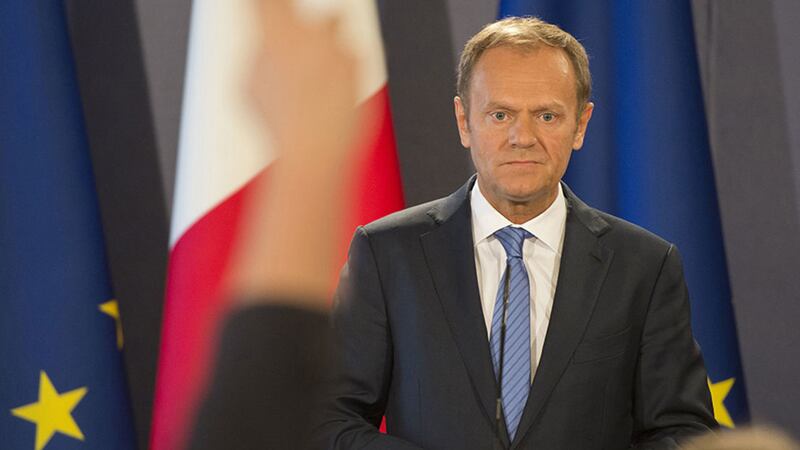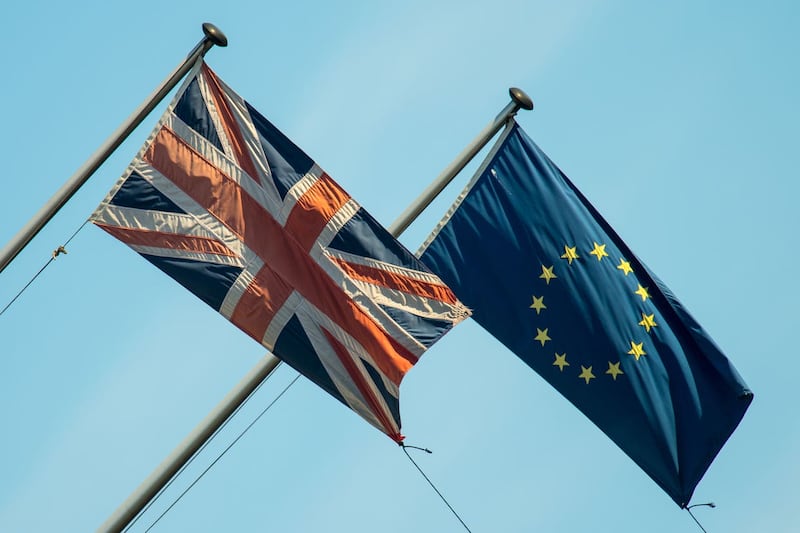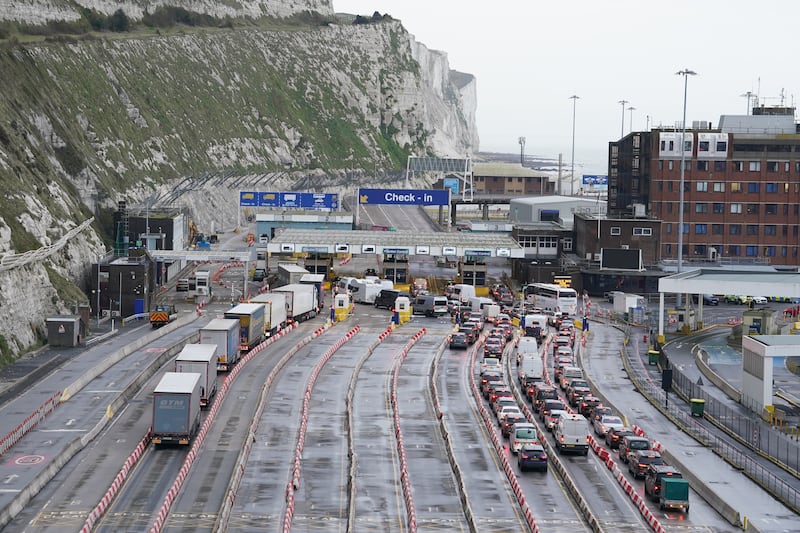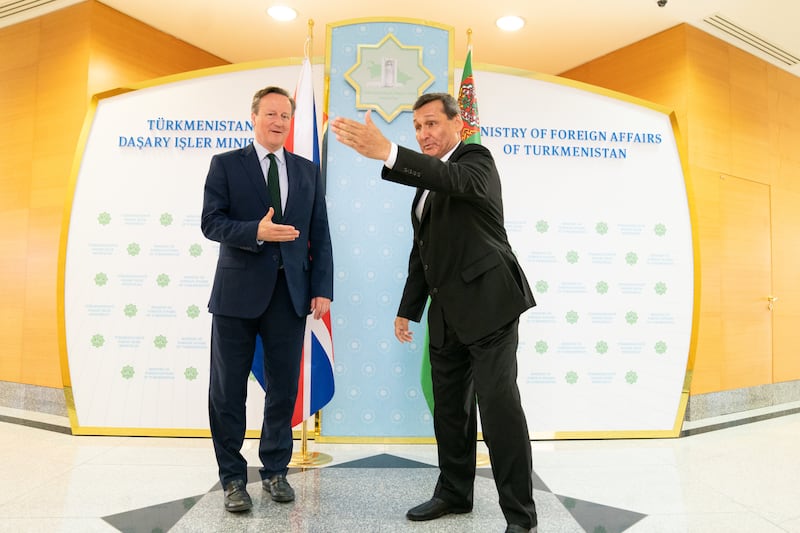EUROPEAN Council President Donald Tusk has said the EU will seek "flexible and creative solutions" to avoid the creation of a hard border in Ireland.
Mr Tusk was speaking as he unveiled his draft negotiating guidelines for forthcoming withdrawal talks for Britain under Article 50 of the EU treaties.
Earlier this week, the European Parliament's chief Brexit negotiator, Guy Verhofstadt, said the EU must take on board the interests of the 27 remaining member states, including the Republic.
"We recognise, as a parliament, that there is an special threat on Ireland and also on Northern Ireland and that new unrest in Northern Ireland has absolutely to be avoided," he said.
"Therefore, we are very clear the Brexit agreement needs to fully respect the Good Friday Agreement in all its aspects. That means also that we will never accept a hard border again between Northern Ireland and the Irish Republic."
Mr Tusk said today negotiations on future trade relations between Britain and the EU could begin as early as this autumn.
But the move, much desired by the British government, will only take place once "sufficient progress" has been achieved in talks on the arrangements for Britain's withdrawal.
Mr Tusk did not spell out what progress would be regarded as sufficient, but his words are likely to be interpreted as referring to the settlement of a "divorce bill" of an estimated £50 billion set to be presented to the UK.

He insisted that Brussels will take a "constructive" approach and wants to keep the UK as a "close partner" on trade and security in the future.
Withdrawal negotiations were essentially a matter of "damage control" following a Brexit decision which had created "disruption and uncertainty", he said, predicting that talks would be "difficult, complex and sometimes even confrontational".
But he said: "The EU27 does not and will not pursue a punitive approach. Brexit in itself is already punitive enough.
"After more than 40 years of being united, we owe it to each other to do everything we can to make this divorce as smooth as possible."
Speaking in Malta, Mr Tusk said he will visit London for talks with Theresa May ahead of a special summit of the 27 remaining EU states in Brussels on April 29, when they are expected to approve the negotiating guidelines, clearing the way for talks to begin in earnest.
He issued a firm rejection of Britain's call for simultaneous divorce and trade talks.
"Starting parallel talks on both issues at the same time, as suggested by some in the UK, will not happen," he said.
But he held out the hope that talks could move on to future trade relations within a matter of months.
"It must be clear that EU, as 27, decides if sufficient progress has been achieved, probably in the autumn, at least I hope so."
While the guidelines insist that a trade deal can only be formally concluded once the UK has ceased its membership, they add that it will be possible to negotiate "an overall understanding on the framework for the future relationship" prior to Brexit to allow for a swift agreement after withdrawal.
The guidelines represent the Council's formal response to Mrs May's letter on Wednesday notifying Brussels of the UK's intention to quit under Article 50.
The unprecedented decision to withdraw creates "significant uncertainties that have the potential to cause disruption, in particular in the UK but also in other member states," said the draft guidelines unveiled by Mr Tusk.
They state that the EU will "give priority to an orderly withdrawal", and will take a phased approach, with the first phase aiming to settle the terms of the UK's removal from the rights and obligations derived from membership, and provide "as much clarity and legal certainty as possible" to citizens and businesses.
Only once "sufficient progress" has been achieved on this phase will talks move on to the future relationship.
In a clear warning to the UK not to attempt to gain advantage by using "divide-and-rule" tactics to cut special deals with national capitals, the guidelines state that the EU will "act as one".
"So as not to undercut the position of the Union, there will be no separate negotiations between individual member states and the United Kingdom on matters pertaining to the withdrawal," it said.
The guidelines promise the EU will take a "constructive" approach to negotiations and hopes to keep the UK as a "close partner" in the future.
But they stress that the EU's overall objective will be "to preserve its interests, those of its member states, its citizens and its businesses".
Speaking in Malta, Mr Tusk issued a firm rejection of Britain's call for simultaneous divorce and trade talks.
"Starting parallel talks on both issues at the same time, as suggested by some in the UK, will not happen," he said.
He said the EU shared the UK's desire for a close future partnership.
"Strong ties reaching beyond the economy, and including security co-operation remain in our common interest," he said.
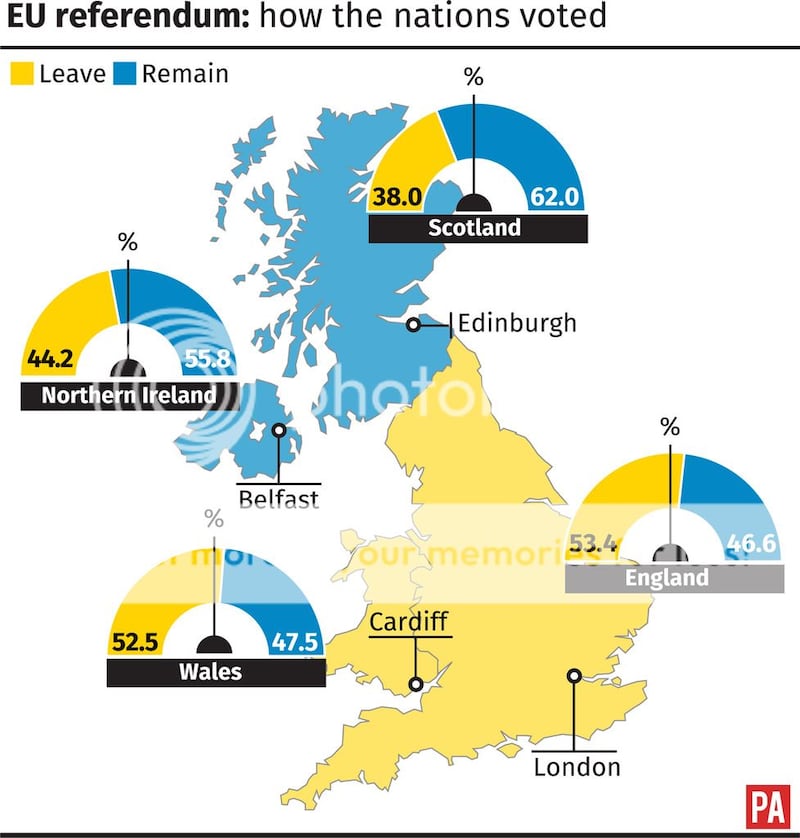
Mr Tusk said that the Article 50 withdrawal negotiations were essentially a matter of "damage control" and would be "difficult, complex and sometimes even confrontational".
But he said: "The EU27 does not and will not pursue a punitive approach. Brexit in itself is already punitive enough.
"After more than 40 years of being united, we owe it to each other to do everything we can to make this divorce as smooth as possible."
He added: "Our duty is to minimise the uncertainty and disruption caused by the UK decision to withdraw from the EU for our citizens, businesses and member states.
"We have to think of people first. Citizens from all over the EU live, work and study in the UK, and as long as the UK remains a member their rights are fully protected.
"But we need to settle their status and situation after the withdrawal with reciprocal, enforceable and non-discriminatory guarantees."
In a sign of Brussels' determination to extract a "divorce bill" from Britain, Mr Tusk added: "We will need to make sure that the UK honours all financial commitments and liabilities it has taken as a member state.
"It is only fair towards all of those people - communities, scientists, farmers and so on - to whom we, all the 28, promised and owed this money.
"I can guarantee that the EU, on our part, will honour all our commitments."
The negotiating guidelines leave open the possibility of "transitional arrangements" to cover any period between the expected date of Brexit on March 29 2019 and the conclusion of a free trade agreement.
But they make clear that any such arrangements must be "clearly defined, limited in time and subject to effective enforcement mechanisms".
Any future free trade agreement between the UK and EU should be "balanced, ambitious and wide-ranging", but cannot involve "participation in the single market or parts thereof".
In an indication that Brussels will seek to secure British compliance with many of its rules and regulations as part of the price for a deal, the document warns that any agreement must "ensure a level playing field in terms of competition and state aid and must encompass safeguards against unfair competitive advantages through ... fiscal, social and environmental dumping".
The future partnership should include "appropriate enforcement and dispute settlement mechanisms", say the guidelines, which also state that the European Court of Justice will remain "competent to adjudicate" on cases relating to the UK which arise before the date of Brexit.
It stresses that arrangements will have to be made to determine the ECJ's involvement in any cases which are initiated after withdrawal but relate to events occurring before Brexit.
"I know Theresa May well enough, and I know her approach to this issue, this is why I rule out this kind of interpretation and speculation, that security co-operation is used as a bargaining chip. It must be a misunderstanding. Our partners are wise and decent partners."
Mr Muscat said Britain would be given a "clear balance sheet" by the EU on its financial commitments.
"The idea is that we have to come up with a methodology that shows and calculates those commitments, and also what Britain needs to take from European assets, as in a clear balance sheet."
Mr Tusk said he did not believe London intended to use its future co-operation on combating terrorism as a "bargaining chip" in trade negotiations.
Speaking as he arrived for a Nato summit in Brussels, British Foreign Secretary Boris Johnson said: "We really are moving forward now, and there's a lot of goodwill, a lot of willingness to achieve what the Prime Minister has said she wants to achieve, which is an orderly transition and then a deep and special partnership between a strong EU and a strong UK."
A Government spokesman said: "These are draft guidelines and we look forward to beginning negotiations once they have been formally agreed by the 27 member states.
"It is clear both sides wish to approach these talks constructively, and as the Prime Minister said this week, wish to ensure a deep and special partnership between the UK and the European Union."
But Liberal Democrat leader Tim Farron said the guidelines showed "the strength of the EU in these negotiations and the carelessness of the UK Government in isolating themselves from our European allies".
Mr Farron said: "The terms are clear: no sector-by-sector deals, no bilateral negotiations and no new trade deal until the withdrawal terms are agreed. This leaves no doubt that (Brexit Secretary David) Davis' comments about special arrangements for the car industry or financial sector are worthless.
"Tory Cabinet ministers talk about securing a deal with Europe that secures the UK exactly the same benefits as before. Theresa May has been taken to Tusk today."
Labour MP Owen Smith, a leading supporter of the Open Britain campaign, said: "Two days into a two-year negotiation and the Government's lofty rhetoric is colliding with hard reality. The Prime Minister's plan for Britain is a pipe dream.
"The European Council's draft guidelines underline the difficulty the Government will have in keeping its Brexit promises. The Prime Minister promised the exact same benefits on trade, but this has been explicitly ruled out today."
Richard Tice, co-chair of Leave Means Leave said: "By putting the divorce settlement first, the EU are breaching their legal obligations under Article 50.
"If the EU refuse to comply with law during negotiations, Britain should walk away from the table until Brussels come to their senses.
"When you are a member of a gym and you decide to leave, you serve your notice and pay your fee up until that point. You are not liable to pay for the gym's running costs when you are no longer a member. The situation with the EU is exactly the same. They knew what the notice period is."
